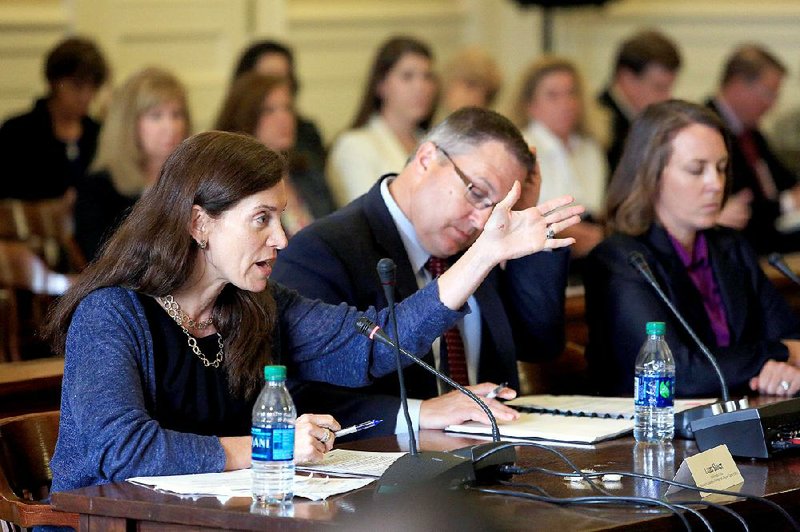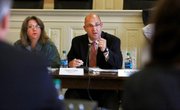The chief executive of the organization overseeing a new, multistate student test used in Arkansas explained and defended the testing system Wednesday to the Governor's Council on Common Core Review.
"I'd give us a grade of 'vastly improved,"' Laura Slover, chief executive officer of the Partnership for Assessment of Readiness for College and Careers, said about the mostly online tests in math and English/language arts now that they're beyond their 2013-14 pilot year and near the finish of their first year of full implementation.
The state tried out the testing program last year and administered it this spring to about 325,000 Arkansas students in grades three through eight and high school. The Partnership for Assessment of Readiness for College Careers tests -- commonly known as PARCC tests -- replace the state's old paper-and-pencil Augmented Benchmark and End-of-Course exams in the two subject areas.
"We had a very successful first year administering a new testing program to 5 million kids," Slover said, referring to national numbers. "It's pretty amazing if you think about building a program from scratch and administering it and doing it as well as PARCC has been able to do it.
"That is not to say that there haven't been issues," she continued. "Many of those were testing-for-the-first-time issues that have been resolved. Some are ongoing problems that need to be fixed."
Slover was among nearly a dozen educators and representatives of testing organizations to make presentations Wednesday to the Common Core Review Council.
Gov. Asa Hutchinson appointed the 16-member council that is led by Lt. Gov. Tim Griffin to evaluate the Common Core State Standards in math and English/language arts, which have been used in a majority of states. Arkansas phased in those standards over a three-year period, from the 2011-12 to 2013-14 school years.
The standards are the basis for the PARCC exams. Those tests were developed by the Partnership for Assessment of Readiness for College and Careers, which is a consortium of 11 states and the District of Columbia.
Some parents and some educators in Arkansas and across the country object to the Common Core standards, saying they are too difficult for the assigned grade levels. They also object to the online PARCC exams because of technology challenges, time demands and fears that the federal government is acquiring individual student data culled from the exams.
Arkansas Act 1074 of 2015 states that the PARCC exam may need to be discontinued after the 2015-16 school year because there is "substantial controversy and question about it" and "a need for more information and understanding of it." The act prohibits a contract with the Partnership for Assessment of Readiness for College and Careers for more than one year at a time.
Teacher and principal members of the governor's council on Wednesday listed their concerns and those of their co-workers about the new test. They cited what they called a confusing instructional handbook for the middle-school tests and too few students being provided testing accommodations for their learning disabilities.
Council members also told of glitches with computers that resulted in testing delays and more time away from regular instruction. They cited frustration with the unavailability of the test results until next fall.
The PARCC exam has been given to about 5 million students in the consortium states, Slover said.
Unlike Arkansas-mandated tests in the past, the PARCC test is administered in two parts: the performance-based assessments in math and English/language arts in March, and the end-of-year assessments in those subjects now underway.
The first part of the test includes written responses and long-response math problems, all of which must be graded by hand. The second part of the test has more short-answer questions and can be graded quickly by machine.
Once the tests are graded, representatives from the different states will meet this summer to establish five performance levels -- 1 through 5 -- with 5 being a top-performance level. About 40 percent of the test questions from this year will be released to the public.
The results from this spring's testing should be returned to the states in October, Slover said. Test results in future years will be returned during the late spring or early summer in subsequent years.
Slover predicted that many of the testing concerns this current school year will be addressed in the coming weeks by the PARCC Governing Board, of which Arkansas Education Commissioner Johnny Key is a member. The nonprofit organization also has other leadership groups that are made up of multiple representatives from the member states, including Arkansas.
The changes this summer are likely to include combining the two testing periods into one to reduce what can now be as many as nine hours of testing for a high school student, she said. Enough time must be devoted to the tests, however, to ensure that they will be a "rich measure" of the critical thinking and problem-solving skills desired for students.
She said the test, which costs in excess of $18 per student, is not a "purchased, off-the-shelf" test but one that is developed by educators and policymakers from the participating states, and one that is saving Arkansas about $3 million a year compared with the state's past exams. That savings is the result of the large number of test-takers, or economies of scale. She predicted that the cost would drop below $18 if the number of state members increases and the number of tested students surpasses 7 million.
Arkansas' contract with PARCC is for $284,491 to manage the testing program. Pearson Education Inc. constructs, delivers and scores the tests within the policy parameters set by the PARCC coalition. Arkansas also has a contract with Pearson for that work.
The Governor's Council on Common Core Review also heard early Wednesday from Scott Montgomery, vice president for policy, advocacy and government relations for the ACT testing company, and from Canda Mueller, vice president of assessment design and psychometrics for Questar Assessment Inc.
ACT, the maker of the college-entrance exam most widely used by Arkansas high school students, began offering in 2014 the ACT Aspire series of tests for grades three through 10, which Montgomery said are approximately 4½-hour exams that can be given online or on paper.
ACT Aspire tests are currently used statewide in South Carolina and Alabama and in a couple of grades in Wisconsin. The tests were developed prior to the Common Core State Standards.
The tests track student preparation for college and jobs but are not linked directly to the new standards.
"We didn't build ACT Aspire to measure the individual standards in Common Core standards," Montgomery said.
"We feel the overlap of the way we measure college and career readiness, grade by grade, has a fairly strong relationship with us being able to tell you that your students are mastering the Common Core or any set of college and career standards whether they are Common Core or not."
ACT also relies on Pearson for scoring tests and other tasks.
Questar worked with Arkansas for about 15 years to produce and score the Arkansas Benchmark and End-of-Course exams after Arkansas teachers determined what the state's students should know and be able to do.
Mueller told the council that the company is considering tests that can be given throughout the school year and be scored by the teachers. That kind of "temperature check" would eliminate the need for weeks of testing at the end of the school year.
Griffin questioned what Pearson does with data it collects on Arkansas students and what information is provided on Arkansas students to the federal government.
"The federal government's interest in data -- they love some data -- is knowing without [student] names how a school is doing?" he asked. "How far down does that go? They aren't getting students. Are they interested in districts?"
Debbie Jones, Arkansas' assistant commissioner for learning services, said the federal government seeks state-level student results and student subgroup results for the state. Student subgroups are based on characteristics such as race or ethnicity, low-income status, eligibility for special-education services and whether the student is a non-native English language learner.
"No student identifiable data," Jones told Griffin.
"So if anybody says that my daughter's name and score is being shared by Pearson with, say, Publisher's Clearinghouse, then I have a cause of action in court?" Griffin asked.
Jones told him that he would have a case.
She said that Arkansas and Pearson have a contract that prohibits Pearson from sharing student-identifiable information with any other entity or the federal government.
The day-long hearing on testing can be viewed on the video gallery link on the lieutenant governor's website: http://ltgovernor.arkansas.gov.
The governor's council will host a "Listening Tour" session from 5-7 p.m. today in the Wal-Mart Community Room of the Bentonville Public Library, 405 S. Main St., Bentonville.
The lieutenant governor's office is planning to live-stream the session via Periscope.
Metro on 05/14/2015

